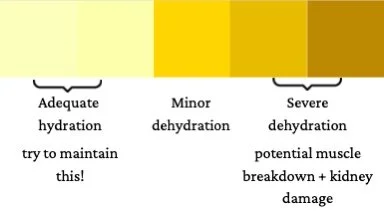How Much Water Should I Drink?
You’ve probably heard that you should drink something like…
8 cups of water per day
your body weight in ounces
a gallon or more
Grab your emotional support water bottle and get ready for an H2O science lesson!
Why water?
I’m sure you already know that water is critical to life, but what does it actually do?
Water is a great solvent capable of dissolving lots of substances. Our blood is primarily water, which makes it a great transporter of things like glucose, vitamins & minerals, and medications.
Consuming enough water helps maintain a healthy blood volume, which contributes to blood pressure.
Fluids help maintain body temperature. Water has a high heat capacity and is also a great coolant (via sweat!).
Water contributes to lubrication inside the body in places like the brain, joints, and eyes.
What’s an Electrolyte?
Within body water are solutes (dissolved substances) which include 4 major crucial minerals: sodium, potassium, chloride, and phosphorus.
These 4 minerals are also called electrolytes, and when dissolved in water, separate into ions (charged particles).
Ions carry an electric charge and can be positive or negative. These ions stimulate nerves & cause muscles to contract.
Role of Electrolytes
Now that we understand electrolytes, let's talk about what they do for us!
Electrolytes assist in fluid balance through a process called osmosis. In short, water always moves from low concentration solute areas to high concentration solute areas. Or put another way, solutes attract water to places where they're higher in concentration. Lots of solutes = bring water toward them.
Electrolytes allow nerves to respond to stimuli. When a stimulus occurs, sodium ions rush into the cell which may cause an electrical impulse along the nerve cell membrane. If the impulse happens, potassium is released to the outside of the cell which balances the membrane's electrical state to normal.
Electrolytes allow muscle contractions to occur. Similar to nerve cell response, muscle fibers respond to a series of electrical impulses, too. Once stimulated, the muscle fiber membrane experiences an increase in calcium, providing the stimulus for a muscle contraction.
What Causes Thirst?
Inside the brain lives a little control system called the hypothalamus.
The hypothalamus contains a group of cells appropriately dubbed the 'thirst mechanism', which can be triggered by:
an increase in sodium
a decrease in blood volume and blood pressure, caused by fluid loss (sweating, blood loss, vomiting, diarrhea, etc)
mouth or throat dryness (reduction in saliva)
The hypothalamus releases a hormone that works with the kidneys to prevent even more fluid loss and potential dehydration.
So…How much Water should I Drink?
The dietary reference intake (DRI) is set to about 2.7-3.7 liters of water per day, but remember that hydration needs are highly individualized and will vary depending on things like:
age
body size
physical activity
our environment
A great way to make sure you're adequately hydrated is to monitor your urine and use a urine chart. I’ve added an example below! Your urine should be clear to pale yellow.
Any questions, comments, or concerns? Feel free to shoot me an email!
As always, thanks for reading. See you next Friday.
-Jory
Urine chart adapted from “Nutrition: An Applied Approach”.
